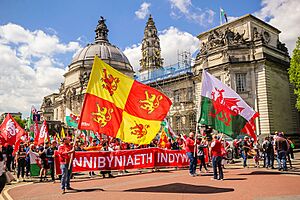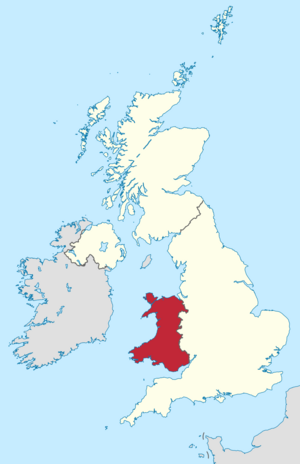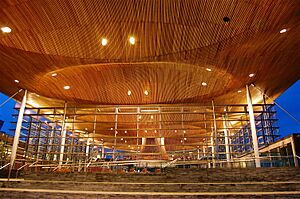Welsh independence facts for kids
Welsh independence (Welsh: Annibyniaeth i Gymru) is the idea that Wales should become its own country. This means it would be a sovereign state, completely separate from the United Kingdom.
Wales was conquered in the 1200s by Edward I of England. This happened after Llywelyn the Last, who was the Prince of Wales, was killed. Edward I then introduced new laws, like the Statute of Rhuddlan in 1284. These laws brought English law to Wales and made the Welsh principality part of the Kingdom of England. Later, Owain Glyndŵr led a revolt around 1400. He brought back Welsh independence for a short time, but Henry IV of England stopped the revolt.
King Henry VIII of England introduced the Laws in Wales Acts 1535 and 1542 between 1535 and 1542. These laws replaced old Welsh laws with English law. They also fully joined the Welsh principality and Marches with England. Wales then got to have representatives in the English parliament and was treated equally under the law. In 1746, the Wales and Berwick Act 1746 said that "England" included Wales. However, parts of this were changed by the Welsh Language Act 1967, which used the term "England and Wales".
The modern movement for Welsh independence started in the mid-1800s. At the same time, a movement for "home rule" also began. Since 1999, Wales has been given some power to make its own laws. This is part of Welsh devolution, where power is moved from the UK parliament to Wales. Today, political parties like Plaid Cymru, Propel, Gwlad, and the Wales Green Party support Welsh independence. The group YesCymru also supports it. Support for independence has grown from 12% in 2014 to 42% in April 2021 (not counting people who said "don't know"). However, a poll in March 2023 showed support dropped to 18%. This might be because people thought a Labour UK Government was likely.
Contents
History of Wales's Government
Early Rule and Revolts
The only king who ever united all of Wales was Gruffydd ap Llywelyn. He ruled as King of Wales from about 1057 until 1063. After him, the Norman invasion of Wales began. The Normans took control of much of Wales for a short time. By 1100, their control was mostly limited to certain lowland areas. The border region between Welsh princes and Anglo-Norman lords became known as the Welsh Marches. The rest of Wales was divided among native Welsh princes.
The most powerful principality was Gwynedd. Its princes took the title of Prince of Wales. English kings tried many times to take over Welsh lands. But it wasn't until Edward I's war against Llywelyn, the last native Prince of Wales, that this was achieved. Llywelyn died in 1282.
A big revolt against English rule was the Glyndŵr Rising from 1400 to 1415. This revolt briefly brought back Welsh independence. Owain Glyndŵr held the first Welsh parliament (Senedd) in Machynlleth in 1404. There, he was declared Prince of Wales. He held a second parliament in 1405 in Harlech. During this time, the Penal Laws against Wales 1402 were put in place. These laws limited the rights of Welsh people. They stayed in effect until the 1600s.
During the reign of Henry VIII, two important laws were passed. They are often called the "Acts of Union". These laws made Wales a part of the King's empire and put English law in Wales. Wales was clearly defined geographically and legally. The laws also gave Welsh people equal status and representation in the English parliament. However, Welsh people did not have full legal or political power. English was also made the official language for government and law, which many people did not like.
The Push for Home Rule (1881–Today)
The movement for "home rule" in Wales began with efforts to separate the Anglican church in Wales from the Church of England. The Sunday Closing (Wales) Act 1881 was the first law to say that Wales was politically and legally different from the rest of England. Most people in Wales belonged to non-Anglican churches, even though members of the Church of England had special rights. This made people think that things could be done differently in Wales.
David Lloyd George, a Member of Parliament (MP) for Caernarfon, strongly supported separating the church. The Welsh Church Act 1914 was finally passed in 1914. This law gave the Church in Wales the freedom to manage its own affairs starting in 1920.
Cymru Fydd and Home Rule All Round
The Cymru Fydd (Young Wales) movement was started in 1893. Its goal was to get a devolved assembly for Wales. Key leaders included David Lloyd George and T. E. Ellis. However, the movement ended in 1896 due to disagreements.
After World War I, many people believed that "home rule all round" was important. This meant self-government for all parts of the UK. Home rule for Ireland had already been passed in 1914. The UK government then thought about home rule for Wales and Scotland. In May 1918, a conference for Welsh home rule was held. Many people in Wales supported the idea, and some Welsh media thought it would happen soon.
However, after the Irish Free State was formed in 1922, the idea of "home rule all round" lost support.
Plaid Cymru and a Parliament for Wales
In 1925, Plaid Genedlaethol Cymru (the National Party of Wales) was founded. It was renamed Plaid Cymru – The Party of Wales in 1945. The party's main goals were self-government for Wales, protecting Welsh culture and language, and Wales becoming a member of the United Nations. Plaid Cymru won its first seat in the UK parliament in 1966. In the 2019 general election, it won four seats. When the Senedd was formed in 1999, Plaid Cymru won 17 of 60 seats.
In the 1950s, people in Wales started to feel less "British." They also realized that Wales was not as wealthy as other parts of England. Many felt that only self-government could help Wales. The Tryweryn flooding in 1965, which almost all Welsh MPs voted against, showed that Wales felt powerless.
On July 1, 1955, a meeting was held to discuss a national petition for a Parliament for Wales. Megan Lloyd George, daughter of David Lloyd George, was a main leader. She presented the petition with 250,000 signatures to the British government in April 1956.

In 1955, Cardiff was declared the capital of Wales. The Labour Party promised to appoint a Secretary of State for Wales in 1959. The Welsh Office was created in 1965. These steps showed a growing desire for Welsh identity. However, in 1979, a plan for a Welsh Assembly was strongly rejected in a referendum. This suggested that most people in Wales did not want their country to have a national future.
In the early 1990s, Labour became committed to giving more power to Scotland and Wales. In 1997, they were elected and held referendums for a Scottish Parliament and a Welsh Assembly. The plan for a Welsh assembly won by a small number of votes in the 1997 referendum.
The National Assembly for Wales was formed in 1999. It was renamed Senedd Cymru/Welsh Parliament in 2020. Since then, more people support and trust the Senedd. They also want it to have more powers. More powers have been given to the Senedd through laws like the Government of Wales Act 2006, the Wales Act 2014, and the Wales Act 2017.
The Independence Movement Today
The idea of Welsh independence has been around since the mid-1800s. Plaid Cymru has supported it for most of the 1900s since it was founded in 1925. In the 2000s, the question of Welsh independence became more important. This was partly because there was more talk about a second Scottish independence referendum.
YesCymru
YesCymru is a group that supports independence but isn't linked to any political party. It was founded in 2014 and opened for public membership in 2016. In 2020, the group said its membership grew quickly, reaching 17,000 members by the end of the year. This was partly due to the British government response to the COVID-19 pandemic.
Referendum Ideas
In 2017, there were plans for a second referendum on Scottish independence. The leader of Plaid Cymru at the time, Leanne Wood, said Wales needed to discuss its own independence. In July 2020, Plaid Cymru suggested a debate in the Senedd about a referendum on Welsh independence. However, it was rejected by 43 votes to 9. This was the first time Welsh independence was debated in the Senedd.
On October 24, 2020, members of the Wales Green Party voted to support Welsh independence if a referendum were held. On December 11, 2020, Plaid Cymru leader Adam Price said that if his party won a majority in the 2021 Senedd election, they would hold an independence referendum by 2026. In the 2021 Senedd Election, Plaid Cymru won 13 seats.
In June 2022, the UK government planned to change a Welsh Government law. Adam Price called this a "power grab" and said it could be "devolution's breaking point." He called for a referendum to protect the Senedd's powers. First Minister Mark Drakeford said that a pro-referendum party would need to win the most seats in an election for a referendum to happen.
Labour for an Independent Wales
Labour for an Independent Wales is a group of Labour Party members. They believe that the best way to achieve a democratic socialist Wales is through independence. This group was formed in 2018. A poll in August 2020 showed that 39% of Welsh Labour voters would vote for independence if a referendum happened.
Independence Marches
On May 11, 2019, the first ever march for Welsh independence was held in Cardiff. It was organized by All Under One Banner Cymru (AUOB Cymru). About 3,000 people attended. On July 27, 2019, AUOB organized another march in Caernarfon, with about 8,000 people. A third march was held in Merthyr Tydfil on September 7, 2019, attracting 5,200 people.
A pro-independence march took place in Wrexham on July 2, 2022. Organizers estimated 6,000–8,000 people attended. Another march was held in Cardiff on October 1, 2022, with about 8,000 campaigners. The first march of 2023 was in Swansea on May 20, with 6,000 to 7,000 supporters.
Brexit and Scottish Independence Influence
Some people believe that Brexit (the UK leaving the EU) has made more people in Wales support independence. They feel that being part of a smaller "English rump" of the UK, if Scotland leaves, seems difficult. Also, some who voted for Brexit might now support independence. They feel that the British political system has failed many working-class communities.
Richard Wyn Jones, director of the Welsh governance centre at Cardiff University, thinks that if Scotland becomes independent first, it would greatly boost the cause of independence in Wales.
Independent Constitution Commission
In September 2021, groups supporting Welsh independence sent an open letter to First Minister Mark Drakeford. They said Wales needed an "independence commission" instead of one to save the UK.
The next month, the Independent Constitutional Commission was launched by the Welsh Labour government. It is led by Professor Laura McAllister and former Archbishop of Wales, Rowan Williams. This commission will look at Wales's future relationship with the rest of the UK, including Welsh independence. The commission's first findings said that independence is a "viable" (possible) option. It also said there are "significant problems" with how Wales is currently governed within the UK.
Future Cymru Forum
At the Plaid Cymru conference in 2022, leader Adam Price announced "The Future Cymru Forum." This will work with the Wales Green Party to research and develop ideas for an independent Wales.
On December 23, 2022, a think tank called Melin Drafod announced the first Welsh independence summit. It was held in Swansea on January 28, 2023. Speakers included Adam Price and other leaders from different groups. The summit aimed to bring people from across the movement together to discuss ideas.
Key Questions for Independence
The Independent Constitution Commission has identified "key questions" about independence. These questions need to be answered to see how independence could work. They plan to find solutions by the end of 2023. Some of these questions include:
- How would Wales pay for public services like schools and hospitals on its own?
- How would Wales pay for things currently handled by the UK government, like pensions and benefits?
- How would Wales manage its own immigration, trade, and international relations?
- How would Wales keep its economy stable and decide on its own currency?
- How would the border between Wales and England work for businesses and people?
- What would be the effects of having a trade border with the rest of the UK, Europe, and the world?
- Would an independent Wales join the EU, and how long would that take?
Arguments for Independence
People who support Welsh independence have several reasons.
Westminster Criticisms
Currently, Wales has 40 out of 650 seats in the UK Parliament (House of Commons). This is a small number. Some people feel this limits Wales's ability to help make big political decisions for the UK. They also don't like the House of Lords, where members are chosen, not elected. Other criticisms of the UK government system include:
- The UK government might not be the government Wales voted for.
- The voting system means a party can win with only a small percentage of votes.
- The UK government sometimes doesn't pay enough attention to Welsh issues or invest enough in Wales.
- The powers given to the Welsh government are limited. Many important matters are kept by the UK government.
- The UK Parliament has the final say, and it could take away powers from Wales.
More Powers for Wales
A main argument for independence is that Wales could make all its own decisions. This includes things like foreign policy (how it deals with other countries) and taxation. Supporters say that an independent Wales would be fully in charge of its own future. The Welsh people would elect a government that only represents Wales. Other proposed powers include:
- Being able to build its own transport and internet systems.
- Being able to build large energy projects to create electricity and sell it.
- Creating its own unique Welsh constitution, including human rights.
- Controlling the Crown Estate (royal lands) to bring in money for Wales.
- Being safer by not being involved in UK foreign affairs.
- Having its own immigration system.
Economy and Trade
Welsh independence would give Wales much more control over its economy. Supporters believe this would help Wales become a successful country.
They point to the Republic of Ireland as an example. After Ireland became independent from the UK in 1922, its economy grew a lot, especially after joining the EU. Supporters say Wales is in a better economic state now than Ireland was in the 1920s. A think tank called Melin Drafod suggests that an independent Wales could raise an extra £3 billion a year for public services through different taxes and policies. Other economic arguments for independence include:
- Having more economic flexibility and being able to adapt better to economic changes.
- Having full control over its money and being able to borrow money.
- Being able to create its own development bank.
- Being able to set competitive tax rates to attract businesses.
- Creating a banking system that protects citizens.
- Being able to fix Wales's financial shortfall and reshape its economy.
- Having choices for its currency, like keeping the Pound, creating a Welsh Pound, or using the Euro.
Culture and Sport
Supporters of independence also argue for:
- The power to create bank holidays, including a proposed St David's Day bank holiday.
- Better protection for Welsh culture.
- The ability to form Welsh teams in sports like cricket or at the Olympics.
- Better protection for the Welsh language.
European Union Membership
The United Kingdom left the EU in 2020. In the 2016 referendum, 53% of Welsh voters chose to leave. However, Plaid Cymru, the main pro-independence party, was against leaving. Many pro-independence campaigners now want Wales to rejoin the EU. They point to the success of small countries like Lithuania and Ireland within the EU. A poll in January 2021 showed that most Welsh voters wanted to rejoin the EU.
Another option is for Wales to join the European Free Trade Association (EFTA). This would allow it to be part of the European single market. Plaid Cymru has said it would explore this option. If Wales joined EFTA, it could also negotiate a free trade deal with England.
Arguments Against Independence
People who want Wales to stay part of the UK have their own reasons:
- Money Problems: Wales has a "fiscal deficit," meaning it spends more than it collects in taxes. This shortfall is currently covered by money from other parts of the UK, especially England. If Wales became independent, it would need to find ways to make up this money, either by raising taxes, cutting spending, or borrowing more.
- Currency: If Wales became independent, there would be questions about its currency. If it kept using the pound sterling without a formal agreement, it wouldn't control its own money policies, like interest rates. These would still be set by the Bank of England, which might prioritize the UK's economy.
- Businesses: Some worry that independence could create uncertainty for businesses. Companies might move their main offices to England if most of their business is there.
- Stronger Voice and Money: Former First Minister of Wales, Carwyn Jones, argued that being part of the UK gives Wales a "much stronger voice on the world stage." He also said that money is transferred from richer parts of the UK to Wales.
Support for Independence
Political Parties in Wales
- Plaid Cymru
- Wales Green Party (supports independence if a referendum is held)
- Propel
- Gwlad
- Socialist Workers' Party
Individuals Who Support Independence
Many people from different backgrounds support Welsh independence, including:
- Charlotte Church - Singer
- Dafydd Iwan - Folk singer and campaigner
- Neville Southall - Former football player
- Iolo Williams - Nature observer and TV presenter
- Julian Lewis Jones - Actor
- Angharad Mair - TV presenter
- Callum Scott Howells - Actor
- Ashton Hewitt - Rugby player
- Andy John - The current Archbishop of Wales
- Russell T Davies - Screenwriter and producer
Politicians Supporting Independence
- Adam Price - Former leader of Plaid Cymru
- Leanne Wood - Former leader of Plaid Cymru
- Rhun ap Iorwerth - Current leader of Plaid Cymru
- Dafydd Wigley - Lord and former leader of Plaid Cymru
- Gwynoro Jones - Former Labour MP
Opposition to Independence
Political Parties in Wales
- Welsh Labour
- Welsh Conservatives
- Welsh Liberal Democrats
- Co-operative Party
- UK Independence Party
- Reform UK
- Abolish the Welsh Assembly Party
Other Ideas for Wales's Future
Besides independence, there are other ideas for how Wales could be governed:
- More Devolution: This means giving even more powers from the UK Parliament to the Welsh government. It could also mean giving more power to local councils within Wales.
- Decentralizing Power: This idea suggests that power and wealth should be spread out more across the UK, not just in London. It also means spreading power more within Wales, so not everything is decided in Cardiff.
- Changing Devolution: Some argue that the current way power is shared between the UK and Wales causes problems. They suggest changing how powers are given out to make governments work together better. For example, Wales could have more say over immigration if the UK and Wales worked together more on transport or energy.
- Federal System: This would mean the UK becomes a federal country. In a federal system, different parts of the country (like Wales, Scotland, England, and Northern Ireland) would have their own governments with clear powers, while a central government handles things for the whole country. This is seen as a way to prevent the UK from breaking up.
Public Opinion on Independence
Polls are regularly carried out to see what people in Wales think about independence. The question usually asked is: "Should Wales be an independent country?" These polls have been done since 2007, and more often since 2021.
See also
Wales
- Culture of Wales
- History of Wales
- Welsh nationalism
- Parliament for Wales Campaign
- Yes for Wales
- Glyndŵr Rising
Related Movements
- Scottish independence
- United Ireland
- English independence
- Potential breakup of the United Kingdom
 | Isaac Myers |
 | D. Hamilton Jackson |
 | A. Philip Randolph |






